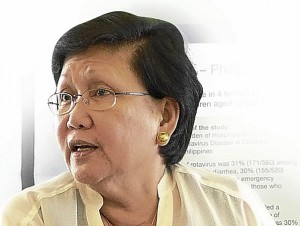Protecting infants against potentially deadly diarrhea

DR. Montellano urges parents to be responsible and have their children vaccinated against a potentially deadly rotavirus infection. Photo by Charles E. Buban
Diarrhea coupled with vomiting are two of the most common symptoms that strike children under 5 years.
Worldwide, rotavirus infection is the most common cause of these two symptoms and is responsible for 66 percent of cases here in the Philippines.
Occurring up to 20 times a day and for many days on end, both diarrhea and vomiting not only is uncomfortable for the child as well as stressful for the parents who needed to continuously change and clean clothes. The two symptoms could lead to death if not properly addressed.
In fact, here in the country, diarrhea and vomiting is considered the second leading killer of children under 5 years, with close to 4,000 deaths annually—an unfortunate statistic considering this number could have been avoided had their parents found time to vaccinate them against rotavirus infection.
“Getting your child immunized against dangerous rotavirus infection is something any parent can do to protect their infant from the very serious outcome of diarrhea and vomiting,” reminded Dr. May Montellano, president of the Pediatric Infectious Diseases Society of the Philippines.
Dehydration
Montellano reminded that watery diarrhea (often foul-smelling, green or brown) and frequent vomiting due to rotavirus infection can lead to the loss of body fluids (dehydration) which in some instances may be severe enough to require hospitalization.
But aside from these two symptoms, infants or young children may also suffer from abdominal pain, fever, inability to focus or is less responsive to touch or words, less frequent urination, no tears when crying, dry, cool skin, frequent, dry or sticky mouth and extreme thirst.
She said that while rotavirus vaccine will not prevent diarrhea or vomiting caused by other germs, vaccination is very effective in preventing diarrhea and vomiting caused by rotavirus. Most babies who get the vaccine will not get rotavirus diarrhea at all, and almost all of them will be protected from severe rotavirus diarrhea.
The first dose (orally taken) must be given once the infant reaches 6th week of age or until reaching the age 14th weeks and 6 days.
The last and third dose should be given by 8th months of age.
“Parents should not miss this as rotavirus vaccine may be given at the same time as other childhood vaccines,” Montellano said.
She explained that the vaccine is important because rotavirus is contagious and the infection is usually spread from person to person, through the fecal-oral route, which happens when viruses found in the stool of one child are swallowed by another child.
“Just a minute amount of the virus that could be present in small amounts of fecal matter found on surfaces such as toys, books and clothing; on the hands of parents or child-care providers; through intake of fecally contaminated water or food; or by respiratory droplets that people sneeze, cough, drip, or exhale, is more than enough to infect another infant or child,” Montellano said.
Once an infant has been exposed to rotavirus, it takes approximately two days for symptoms to appear.
Different rotavirus types
But what parents should realize, reminded Montellano, is the fact that their infants and young children may be infected from rotavirus more than once as there are many different rotavirus types, each as infectious and as severe as the other.
“This is the reason parents should give their children a vaccine that protects from at least five of the most common rotavirus serotypes circulating in the region or country,” Montellano explained.
Here in the country only the one produced by Merck Sharp and Dohme (MSD) is specifically designed to help protect against five of the most common rotavirus serotypes that cause more than 90 percent of rotavirus disease (G1, G2, G3, G4 and P[8]).
“Each of the serotype is as infectious as the other and causes the same symptoms. As a result, if you are only protected against one, you may not be protected against the rest that are also present in the environment. Moreover, infants and children could easily spread rotavirus both before and after they become sick with diarrhea and vomiting,” Montellano warned.
She added that while some parents might find the vaccine a little costly, not doing so would be much more expensive and dangerous (price of the vaccine varies from one private hospital to another although MSD’s vaccine is now included in the Department of Health’s expanded program on immunization).
The DOH’s rotavirus vaccination campaign will initially benefit some 700,000 newborns from the 5.2 million families identified as “poorest of the poor” by the Department of Social Welfare and Development under its national household targeting system.